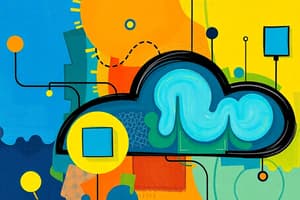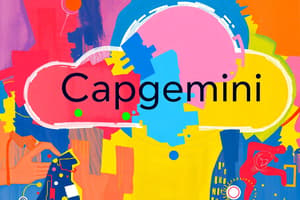Podcast
Questions and Answers
Quel est le rôle principal d'un Architecte Fonctionnel ?
Quel est le rôle principal d'un Architecte Fonctionnel ?
- Animer la communauté API
- Gérer les recrutements de consultants
- Coacher les carrières des employés
- Cadrer les besoins métiers (correct)
Quel est le rôle d'un Tech Lead dans le cadre de l'architecture ?
Quel est le rôle d'un Tech Lead dans le cadre de l'architecture ?
- Gérer la communauté API
- Traduire l'architecture de la solution en composants techniques (correct)
- Réaliser des formations pour les employés
- Effectuer des recrutements
Quelle activité n'est pas associée au rôle de Consultant/Manager chez Capgemini ?
Quelle activité n'est pas associée au rôle de Consultant/Manager chez Capgemini ?
- Cadrage des besoins métiers (correct)
- Génération de formations
- Animation de la communauté API
- Avants ventes
Quel élément est essentiel dans le rôle d'Architecte Solution ?
Quel élément est essentiel dans le rôle d'Architecte Solution ?
Parmi les tâches suivantes, laquelle est associée à un Tech Lead ?
Parmi les tâches suivantes, laquelle est associée à un Tech Lead ?
Quelle part des 200 plus grandes entreprises publiques a bénéficié des initiatives d'inclusion numérique depuis 2018?
Quelle part des 200 plus grandes entreprises publiques a bénéficié des initiatives d'inclusion numérique depuis 2018?
Combien d'années consécutives Capgemini a-t-il été nommé l'une des entreprises les plus éthiques au monde par l'Ethisphere Institute?
Combien d'années consécutives Capgemini a-t-il été nommé l'une des entreprises les plus éthiques au monde par l'Ethisphere Institute?
Quel institut a classé Capgemini comme le numéro 1 pour la qualité de ses recherches?
Quel institut a classé Capgemini comme le numéro 1 pour la qualité de ses recherches?
Quelle fraction des 11 objectifs de développement durable de l'ONU Capgemini contribue-t-il?
Quelle fraction des 11 objectifs de développement durable de l'ONU Capgemini contribue-t-il?
Quel est le sentiment exprimé par Aiman Ezzat concernant le travail chez Capgemini?
Quel est le sentiment exprimé par Aiman Ezzat concernant le travail chez Capgemini?
Quel diplôme Aiman Ezzat a-t-il obtenu à l'Université d'Avignon?
Quel diplôme Aiman Ezzat a-t-il obtenu à l'Université d'Avignon?
Quels mots décrivent le rôle de Capgemini dans les transformations majeures d'aujourd'hui?
Quels mots décrivent le rôle de Capgemini dans les transformations majeures d'aujourd'hui?
Quels sont les moyens par lesquels Capgemini s'efforce de rendre notre planète meilleur?
Quels sont les moyens par lesquels Capgemini s'efforce de rendre notre planète meilleur?
Quelle est une des limitations d'une application monolithique?
Quelle est une des limitations d'une application monolithique?
Quel avantage n'est pas associé aux microservices?
Quel avantage n'est pas associé aux microservices?
Quelle propriété des microservices favorise un développement flexible?
Quelle propriété des microservices favorise un développement flexible?
Dans une architecture monolithique, quelle est la conséquence d'un échec critique après une mise à jour?
Dans une architecture monolithique, quelle est la conséquence d'un échec critique après une mise à jour?
Quelle caractéristique décrit mieux la modularité des microservices?
Quelle caractéristique décrit mieux la modularité des microservices?
Qu'est-ce qui n'est pas un avantage d'une application monolithique?
Qu'est-ce qui n'est pas un avantage d'une application monolithique?
Quel aspect des microservices permet une isolation des données?
Quel aspect des microservices permet une isolation des données?
Quel est un inconvénient majeur des mises à jour dans une application monolithique?
Quel est un inconvénient majeur des mises à jour dans une application monolithique?
Quelle caractéristique des projets non-cloud est soulignée par rapport aux projets cloud ?
Quelle caractéristique des projets non-cloud est soulignée par rapport aux projets cloud ?
Comment les projets cloud gèrent-ils un composant qui échoue ?
Comment les projets cloud gèrent-ils un composant qui échoue ?
Quel mot décrit le mieux la façon dont les projets cloud sont perçus par rapport aux projets non-cloud ?
Quel mot décrit le mieux la façon dont les projets cloud sont perçus par rapport aux projets non-cloud ?
Quel terme illustre la philosophie de gestion des projets non-cloud ?
Quel terme illustre la philosophie de gestion des projets non-cloud ?
Quelle différence entre les projets non-cloud et cloud est la plus frappante concernant leur conception ?
Quelle différence entre les projets non-cloud et cloud est la plus frappante concernant leur conception ?
Quel événement a été enregistré à 11:30:17?
Quel événement a été enregistré à 11:30:17?
Quelle opération a été effectuée pour le 'correlationId=wxyz-5678' à 11:30:26?
Quelle opération a été effectuée pour le 'correlationId=wxyz-5678' à 11:30:26?
Quel contrôleur est associé à la journalisation de la mise à jour de l'analyse à 11:30:20?
Quel contrôleur est associé à la journalisation de la mise à jour de l'analyse à 11:30:20?
À quel moment a eu lieu un avertissement sur les données de profil utilisateur?
À quel moment a eu lieu un avertissement sur les données de profil utilisateur?
Quel service a programmé une nouvelle tentative de paiement?
Quel service a programmé une nouvelle tentative de paiement?
Quel est le dernier événement mentionné dans les logs?
Quel est le dernier événement mentionné dans les logs?
Quel 'correlationId' est associé à l'envoi de données analytiques?
Quel 'correlationId' est associé à l'envoi de données analytiques?
Qui a exécuté la mise à jour du profil utilisateur à 11:30:18?
Qui a exécuté la mise à jour du profil utilisateur à 11:30:18?
Quel est l'objectif principal du modèle Event Broker ?
Quel est l'objectif principal du modèle Event Broker ?
Quelles caractéristiques favorisent la souplesse dans le modèle Event Broker ?
Quelles caractéristiques favorisent la souplesse dans le modèle Event Broker ?
Quelle affirmation décrit le mieux le processus d'authentification ?
Quelle affirmation décrit le mieux le processus d'authentification ?
Comment l'autorisation diffère-t-elle de l'authentification ?
Comment l'autorisation diffère-t-elle de l'authentification ?
La scalabilité dans le modèle Event Broker permet à quoi ?
La scalabilité dans le modèle Event Broker permet à quoi ?
Quel est le rôle des règles dans le routage des événements ?
Quel est le rôle des règles dans le routage des événements ?
Quel concept est essentiel après l'authentification pour sécuriser un utilisateur ?
Quel concept est essentiel après l'authentification pour sécuriser un utilisateur ?
Pourquoi le modèle Event Broker favorise-t-il l'évolutivité ?
Pourquoi le modèle Event Broker favorise-t-il l'évolutivité ?
Flashcards
Parcours Mathématiques Fondamentales
Parcours Mathématiques Fondamentales
Un cursus universitaire en mathématiques, spécialisé dans les fondamentaux.
Licence Mathématiques
Licence Mathématiques
Un programme universitaire offrant une formation spécialisée en mathématiques pures.
Université d'Avignon
Université d'Avignon
L'université d'Avignon est une institution d'enseignement supérieur située en France.
Architecte Solution
Architecte Solution
Signup and view all the flashcards
Tech Lead
Tech Lead
Signup and view all the flashcards
Architecte Fonctionnel
Architecte Fonctionnel
Signup and view all the flashcards
Architecture Applicative
Architecture Applicative
Signup and view all the flashcards
Animation de la communauté API
Animation de la communauté API
Signup and view all the flashcards
Application monolithique
Application monolithique
Signup and view all the flashcards
Facilité de déploiement
Facilité de déploiement
Signup and view all the flashcards
Gestion de la complexité
Gestion de la complexité
Signup and view all the flashcards
Faible dépendance
Faible dépendance
Signup and view all the flashcards
Évolutivité coûteuse
Évolutivité coûteuse
Signup and view all the flashcards
Fréquence de mise à jour
Fréquence de mise à jour
Signup and view all the flashcards
Difficulté de correction
Difficulté de correction
Signup and view all the flashcards
Taille des applications monolithiques
Taille des applications monolithiques
Signup and view all the flashcards
Authentification
Authentification
Signup and view all the flashcards
Autorisation
Autorisation
Signup and view all the flashcards
Modèle de courtier d'événements
Modèle de courtier d'événements
Signup and view all the flashcards
Évolutivité
Évolutivité
Signup and view all the flashcards
Couplage lâche
Couplage lâche
Signup and view all the flashcards
Microservices
Microservices
Signup and view all the flashcards
Sécurisation des microservices
Sécurisation des microservices
Signup and view all the flashcards
Journalisation
Journalisation
Signup and view all the flashcards
Les projets non-cloud: des "animaux de compagnie"
Les projets non-cloud: des "animaux de compagnie"
Signup and view all the flashcards
Les projets cloud: du "bétail"
Les projets cloud: du "bétail"
Signup and view all the flashcards
Gestion des erreurs en non-cloud
Gestion des erreurs en non-cloud
Signup and view all the flashcards
Gestion des erreurs en cloud
Gestion des erreurs en cloud
Signup and view all the flashcards
CorrelationId
CorrelationId
Signup and view all the flashcards
DEBUG
DEBUG
Signup and view all the flashcards
INFO
INFO
Signup and view all the flashcards
WARN
WARN
Signup and view all the flashcards
Analytics
Analytics
Signup and view all the flashcards
Payment Service
Payment Service
Signup and view all the flashcards
Shipping Service
Shipping Service
Signup and view all the flashcards
User Service
User Service
Signup and view all the flashcards
Study Notes
Microservices & Cloud Computing - Course Introduction
- The course, "Microservices & Cloud Computing", is offered by Capgemini at ESIEA - 4a.
- The course duration is from 20/11/2024 to 21/11/2024.
- The course will cover various cloud concepts.
Agenda
- The agenda includes four presentations about cloud concepts.
- Presentation 1: Introduction to Information Systems (SI).
- Presentation 2: Microservices & Cloud Computing.
- Presentation 3: Cloud Architectures.
- Presentation 4: Cloud Scalability.
Agenda (Microservices segment)
- The agenda for the Microservices section includes:
- Introduction to Microservices
- Essential Microservices Patterns
- Securing Microservices
- Deploying and Maintaining Microservices
- Logging
- Monitoring
- Introduction to Cloud Computing
Capgemini Overview
- Capgemini is a global leader in partnering with companies to transform and manage their business through technology.
- The company has more than 360,000 team members across over 50 countries.
- Capgemini is committed to unlocking the true value of technology for businesses, people, and society for a more inclusive, sustainable future.
JT: Professional Background
- JT holds a degree in Mathematics, specializing in fundamental mathematics, from the University of Avignon.
- JT also holds a Master's in Mathematics with a focus on Data Mining and Operational Research from the University of Aix-Marseille.
- JT has experience in software development (4 years), including roles as a data scientist.
- JT worked for 3 years in an IT services company (ESN) and had roles in the Spatial-Defense industry.
- JT has worked at Capgemini Financial Services for 8 years, focusing on architecture solutions, including Team Lead roles.
TD: Professional Background
- TD has a Bachelor's degree in Information and Communication Technologies from the University of Orleans.
- TD has a Master's degree in Applied Computer Methods for Business Management, with a focus on Distributed Networks, from the University of Orleans.
- TD has worked at Capgemini in a series of roles, including developer, team lead, and project manager.
- TD's experience includes roles in various industries such as application developments and financial services.
KN: Professional Background
- KN has a Master's degree in Biotechnological Engineering and Agro-industry Management from the University of La Rochelle.
- KN has experience in agro-industrial production management (2 years), developed expertise in Java development, API management, and architecture (6 years at Capgemini Financial Services).
TD & KN: Roles
- TD's Role as an architect involves defining solutions and guiding teams, technical lead tasks concerning architecture, and knowledge sharing.
- KN's Role includes defining solutions and working with teams, architecture lead roles, and supporting teams.
Monoliths & Microservices
- Monoliths are single-tiered software applications.
- Benefits include deployment ease and managed complexity.
- Limitations can include costly scalability issues and challenges in continuous deployment and rollback procedures.
Microservice Definition
- A Microservice implements distinct features or functionalities.
- Properties include modularity, autonomy (independent services for development and deployment), and data decentralization (individual databases).
Microservice Benefits
- Scalability (only needed resources are scaled),
- Faster development (due to small, independent services),
- Enhanced optimization (allowing multiple languages), and Fault isolation (failures don't halt the whole application).
Decentralized Architecture Governance & Catalog
- The shift toward decentralized governance in microservices is explained as compared to monoliths.
- The Service Catalog is a repository for available services making it easier for teams to discover, reuse and monitor services.
- Microservices architectures are more complex than monoliths with proper cataloging being important.
- In distributed transactions that span multiple services, rollback procedures can present challenges. Important considerations for End-to-End management, testing and monitoring are highlighted.
Notable Example: Netflix with AWS
- Discusses design patterns employed in Netflix's microservices architecture.
- Addresses limitations in the choice of monolithic architectures in applications, such as those found in the Netflix DVD Data Center architecture.
- Describes how techniques like Network Latency mitigation were crucial in avoiding cascading failures and bottlenecks.
DDD (Domain-Driven Design)
- DDD focuses on aligning software design with core business domains.
- It emphasizes collaboration with domain experts to establish a Shared Language model representing business concepts and rules.
- Subdomains and Bounded Contexts are used to divide complex systems for enhanced flexibility and scalability. A Ubiquitous Language is crucial for effective communication and understanding within the development team and with the business domain experts..
Circuit Breaker
- Circuit Breaker is a design pattern to prevent cascading failures.
- An 'open' circuit stops requests to the impacted service during temporary periods of instability, then resumes requests to that service once the circuit is closed.
- Popular implementations include Hystrix, Resilience4J and spring for resilience and fault handling.
- Demonstrates how to manage errors and prevent them from having wider cascading effects.
Retry Pattern
- Strategies for implementing retry mechanisms.
- Fixed Delay strategy with a constant retry interval.
- Incremental Delay strategy with an increasing retry delay.
- Exponential Backoff strategy with an exponential increase in retry delay.
- Used for handling transient errors or failures.
Event Broker Pattern
- Describes the event broker pattern in software architecture.
- Key features for Event Routing, scalability and loose coupling are mentioned.
- Enables asynchronous, event-driven communication, enabling system flexibility and resilience.
Authentication vs. Authorization
- Authentication verifies the user's identity.
- Authorization defines permitted actions.
- Authentication typically precedes authorization to access network resources.
SSO (Single Sign-On) & JWT Patterns
- Single Sign-On approach allows users access to multiple applications.
- OAuth protocol allows third-party access limited to user resources.
- OIDC protocol is a layer built on top of OAuth, adding identity verification and access profile information.
OAuth Pattern
- Steps involved in the OAuth process, including user login requests, granting permissions and receiving access tokens for authorized access.
OIDC Pattern
- Steps involved in the OIDC process including user interaction with the IdP (Identity Provider), and acquiring and verifying access tokens and security tokens.
Monitoring Tools
- Grafana, Splunk are open-source software for data viz and monitoring.
- Allow using various data sources for real-time observability and performance tracking.
Importance of CI/CD and DevOps
- CI/CD pipelines consist of several stages including planning, design, coding, compilation testing, and publishing to deployment environments.
- Automation is crucial for agility in software projects, enabling quicker scaling and faster recovery from errors, and reducing downtime.
Simple and Complex CI/CD for Java Projects
- Various CI/CD pipelines are explained for Java projects, highlighting different approaches for source code management automation.
- Simple pipelines include tools like Jenkins, Dockerized deployments and testing.
- Complex CI/CD pipelines used by banks include more configuration and integrations to multiple environments and processes, in order to manage larger projects with significant integration needs.
Cloud Service
- Describes aspects and characteristics that define a cloud service, such as demand-based IT services, automated deployments, scalability, and a pay-per-use model.
Differences between Non-Cloud and Cloud Projects
- Non-Cloud projects (Pets), involve unique, custom, and personalized components.
- Cloud projects (Cattle), involve standardized, replaceable components.
Liabilities (Cloud vs Client)
- This part highlights the shared responsibility model between the client and cloud providers with descriptions regarding various aspects of cloud services (authentication, access management, software configurations, and hardware infra).
Course Conclusion/Next Steps
- The presentation concludes, potentially with call to action requests for further inquiries, or references to next steps.
- Contact details and social media links for the instructors (Thomas Desrut, Kevin Navarri, Julien Trouillet).
Studying That Suits You
Use AI to generate personalized quizzes and flashcards to suit your learning preferences.




